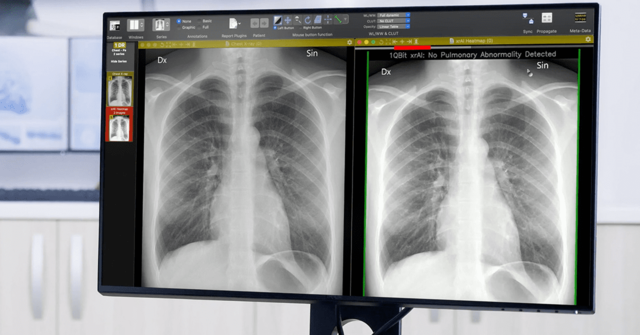By: Krista Davidson
28 Sep, 2020

A Canadian startup company has developed a computer vision and machine learning approach for the real-time diagnosis of lung abnormalities on chest X-rays. The technology was developed in collaboration with Mark Schmidt, Canada CIFAR AI Chair, Amii.
1QBit, a Vancouver-based software firm, saw an important opportunity to apply their decision-support tool, XrAI, to COVID-19. XrAI improves the accuracy and consistency of chest X-ray interpretation and supports medical teams in identifying lung abnormalities on chest X-rays. The tool is integrated into existing clinical information systems, minimizing disruption to the clinician’s workflow by providing accurate real-time interpretation of the X-ray.
XrAI is the first AI radiology tool to be approved by Health Canada as a Class III Certified Medical Device.
Traditionally, a positive COVID-19 diagnosis results from a sinus swab and nucleic acid-based polymerase chain reaction (PCR) test. However, the global demand for swab tests has put a strain on the supply chain, and the test is not available in every country. Chest X-rays can confirm the presence of pneumonia, the primary symptom of COVID-19 and the respiratory symptom associated with the virus.
“XrAI opens up a new frontier of sophisticated AI tools in medicine. As we deploy XrAI across a number of health authorities in Canada, the positive impact of a scalable AI tool will be felt particularly by frontline professionals during this pandemic,” says Deepak Kaura, CMO, 1QBit. “The adoption of AI showcases Canada’s leadership and is a combination of academia, industry and government working together to enhance the provision of care.”
The tool has correctly identified COVID-19-related pneumonia in 100 per cent of cases drawn from publicly available data. Several Canadian health organizations are deploying it as part of Canada’s Digital Supercluster COVID-19 program, a program dedicated to supporting the research and development of COVID-19 solutions. The tool was developed using three years of ethnically, geographically, and demographically diverse longitudinal data sourced from more than 500,000 anonymized radiography images.
Schmidt sees the tool as a positive step forward for AI for health. A national coordinated and integrated approach to AI for health, such as those laid out by the CIFAR-convened AI4Health Taskforce would foster similar innovations in Canada. Schmidt is one of dozens of Canada CIFAR AI Chairs conducting research to address the COVID-19 pandemic.
“There are obvious benefits to an integrated AI health system. It could potentially reduce the number of cases where a physician misses something significant and help alleviate the workload of radiologists in parts of Canada (such as rural areas) where radiologists are in high demand. By reducing the variation among radiologists we will be able to more accurately model outcomes in the health system,” he says. Schmidt is an associate professor at the University of British Columbia.
Schmidt hopes that 1QBit’s success will set the stage for AI for health technologies in Canada.
“Canada has one of the best pools of AI researchers in the world, and I hope that other researchers and startups will see that regulatory approval is possible and that it will encourage more of them to explore applications in healthcare,” he says.